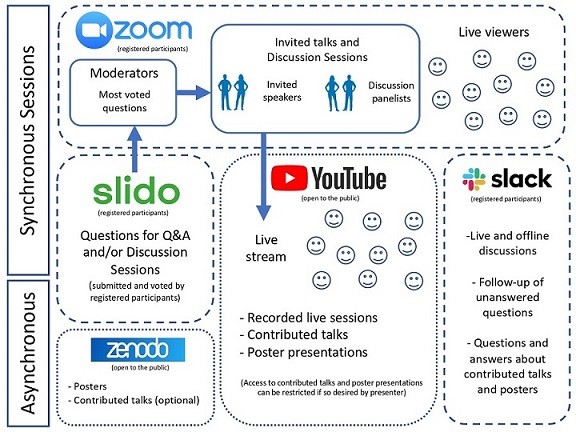Synchronous sessions: review talks, Q&A, and discussion sessions
Every day, there will be 2-3 live review talks on different topics, followed by Q&A sessions and/or moderated Discussion Sessions. These sessions will be held via Zoom Webinars, and will also be streamed to Youtube.
The Q&As will take place after all the invited talks on a particular day. As their name implies, the goal of these sessions will be for the invited speakers to answer questions about their talks. Questions from the attendees can be asked via Slido, and the most voted questions will be asked by the moderators.
The moderated Discussion Sessions will be longer, and will focus on more general topics. The Discussion Sessions will include one or more moderators and a number of panelists, which will consist of the invited speakers for the particular topics discussed in that session, as well registered participants. In order to ensure a properly organized discussion within the available time, the number of panelists will need to be limited. Panelists will be selected from the registered participants which express their interest during the registration process. The rest of the conference participants will be able to watch the discussion via Zoom (i.e., as viewers, only able to watch and listen, but not to talk) or Youtube. Any participant will be able to contribute to the discussion sessions by asking and voting questions through Slido. Questions that cannot be addressed live due to time limitations can be posted to the Slack channel to keep the discussion going offline.
The Review Talks and Discussion Sessions will be recorded and uploaded to Youtube.
Contributed talks and posters
We have received a very positive response from the community, with a great number of participants interested in giving a talk and/or presenting a poster at the conference. To ensure that all participants can present their work regardless of their timezone, all contributed talks will be pre-recorded and offered “on demand” to the conference attendees. The talks will be uploaded to Youtube, and a dedicated section in the conference website will host a list of the links to the different talks, categorized by topic, together with the speaker’s name, affiliation, title, and abstract. Contributed talks should have a maximum duration of 12 min (hard limit). It is not possible to organize individual Q&A sessions for such a number of talks, but we encourage people to contact others through Slack with any questions and comments that they may have. A public community for conference contributions will be created in Zenodo, and contributed talks can be uploaded to it if requested by the presenter.
A similar approach will be followed for posters, which will be uploaded to the public conference community in Zenodo and listed in a separate section in the conference website. Posters should be provided in pdf format.
Each participant can submit one contributed talk and one contributed poster. All contributions will in principle be accepted and presented on the conference website, although we reserve the right to reject any contribution that the LOC and/or SOC deem as inappropriate or against the Code of Conduct of the conference. The contributed talks and posters will be released to the conference attendees a week before the start of the conference.
Conference software: Zoom Webinars, Slack, Slido, and Zenodo
The conference will make use of three different softwares for streaming and interactions:
- Synchronous sessions will be hosted via Zoom’s Webinars, which allow for a large number of attendees and live streaming to Youtube. Although Webinars have live chat and Q&A options, we strongly encourage participants to ask their questions via Slido (see below).
- Slack is an application that enables communication of large groups through different channels, as well as individual interactions. We will create a Slack group for the conference and encourage participants to use Slack for offline discussions, questions regarding contributed talks, and follow-up questions that cannot be answered during Q&A or discussion sessions due to time limitations.
- Slido is a program that allows anyone to send questions (through a web browser). They can be submitted anonymously, and they have to be redacted in a limited number of characters (i.e., short questions). The questions are voted by the participants through Slido, and moderators will ask the most voted questions during the Q&As and discussion sessions. If a participant experiences issues with Slido for some reason, questions can also be posted in the Zoom’s Q&A and moderators will submit them to Slido. Participants will be able to submit questions the whole week (i.e., not only during the actual discussion session).
Additionally, posters (and optionally talks) will be uploaded to Zenodo. Zenodo is an online repository that provides a Digital Object Identifier (DOI) for each upload, making them citable. A community will be created in Zenodo to upload the contributions of the conference. The uploaded contributions will be indexed so that they can appear on ADS. It is also possible to upload contributed talks and poster presentations to Zenodo for those who are interested.
More information about ESO’s use of Zenodo for conference proceedings can be found at https://www.eso.org/sci/meetings/zenodo.html


